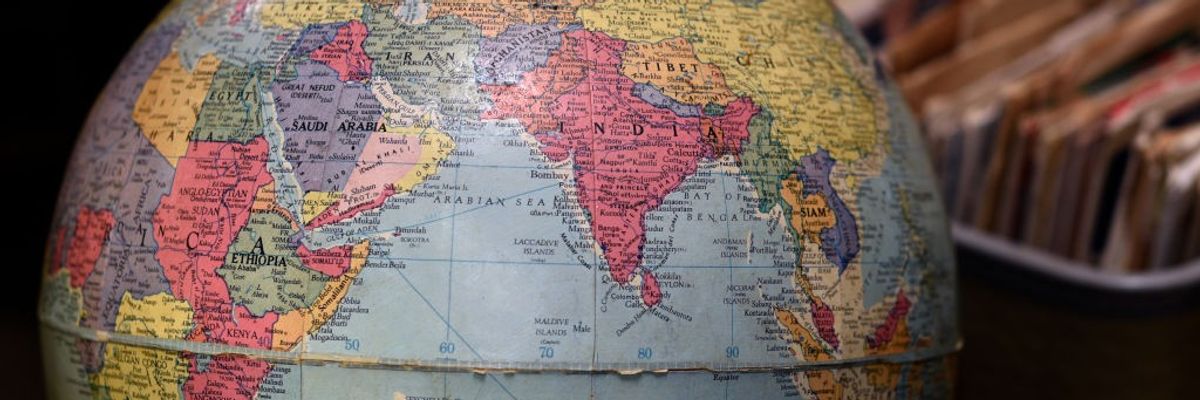It’s both wonderful and odd that we have a thing called “Earth Day,” celebrated on April 22. This earth is what makes our very existence possible–do we really need a reminder to take care of it? Actually, we do, and we need an extra reminder that how we get our food supply is central to caring for the planet.
Despite our ever-intensifying climate crisis, along with widening habitat loss and species extinction, we see our industrial food system literally adding fuel to these preventable fires through its ongoing reliance on fuel-based pesticides, massively polluting factory farms, and a destructive “get big or get out” system of subsidies and unfair prices that harm both farmers and consumers.
On Earth Day and beyond, we need reminders and real action to change our food system’s destructive ways. To save this planet and humanity, we must create a food future that benefits all life on Earth–enabling every living being and species to thrive.
It is unacceptable–and profoundly unsustainable–that industrial agriculture is the largest emitter of methane in the United States, accounting for about 36 percent of all climate-wrecking methane emissions (compared to 30 percent for oil and natural gas). According to a recent study, the livestock industry's air pollution is responsible for more than 12,700 deaths per year — more deaths than are attributed to coal-fired power plants.
To save this planet and humanity, we must create a food future that benefits all life on Earth–enabling every living being and species to thrive.
It’s also unacceptable and unsustainable that our food system relies on toxic (and fossil-fuel-based) pesticides that destroy vital habitats, and that industrial farming is a key driver behind species endangerment and extinction. Peer-reviewed research shows that pesticides cause significant harm to honeybees and other essential pollinators, upon which more than one-third of our food depends, including popular mainstays such as apples, blueberries, strawberries, almonds, avocados, and other fruit, nuts, and vegetables.
How do we stop this ecological disaster in part caused by industrial agriculture? Simply put, we must work overtime to defend our food, farms, and planet from the constant harm of industrial agriculture’s many toxins and pollutants.
This means going up against some of the most powerful multinational chemical companies in the world. It means filing lawsuits and advocating for policies and regulatory actions to stop chemical corporations from covering our Earth with deadly pesticide-coated seeds; and getting Monsanto’s toxic moneymaker dicamba off the shelves. We must challenge government approvals of poisonous pesticides like atrazine, 2,4-D, and bee-killing neonicotinoids like sulfoxaflor, and push the Environmental Protection Agency (EPA) to do its job and test every pesticide for harmful endocrine-disrupting effects on farmers, farmworkers, and families.
Here, in the spirit of Earth Day, are twelve essential actions (in addition to many more!) Center for Food Safety is taking to make food and farming truly sustainable, healthful, and democratic for all.
- Suing the EPA to make regulators do their jobs and rein in toxic dicamba drift, which is destroying farmers’ crops, their livelihoods, and vital species’ habitats.
- Stopping pesticide corporations from covering our Earth with deadly pesticide-coated seeds by challenging an EPA loophole that allows these seeds on the market without reviewing their impacts on endangered species.
- Removing the cancer-causing pesticide glyphosate from the market for all uses.
- Stopping GMO foods and saving GMO food labeling by overturning regulations that could flood the market with GMO crops; and by strengthening U.S. Department of Agriculture (USDA) rules for GMO food labeling.
- Defending animal species and habitats, and biodiversity, by pushing for strong Food and Drug Administration (FDA) regulations on genetically engineered animals.
- Protecting endangered species by ensuring that endangered birds and other species are safeguarded from the dangers of pesticides and industrial agriculture.
- Challenging EPA approval of other pesticides like the endocrine disruptor atrazine.
- Restoring strong animal welfare protections in organic livestock production, and stopping polluting factory farms.
- Protecting oceans from polluting aquaculture facilities (factory farms of the sea) by challenging government permits for these facilities in state and federal waters.
- Challenging EPA’s lack of review of the whole formula of pesticides (not just the main ingredient).
- Halting an $8 billion international GMO agenda through a new international coalition and campaign to end funding for biotech and pesticide companies pushing “false solutions” to the climate crisis.
- Educating and mobilizing people nationwide to ensure that the 2023 Farm Bill prioritizes people’s health, farmers’ survival, and our climate future.
While this is certainly a lot to take on, it’s what CFS has been doing successfully for 25 years. And these actions are vital to creating a healthy, sustainable future for us all. Washington, DC may be gridlocked, but nature casts its own votes every day, regardless of political party. Earth Day is no exception.
Nature, the land, habitats, and ecologies do not care about politics–they simply live, struggle, adapt, or die based on our actions (and inactions). We must stay vigilant to give our environment and future a fighting chance.
